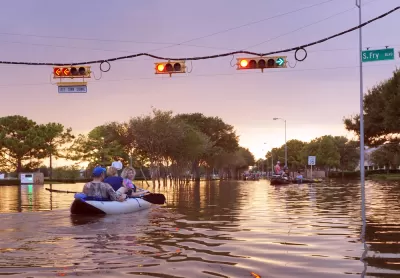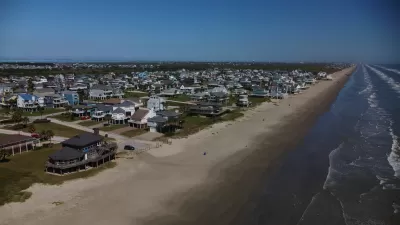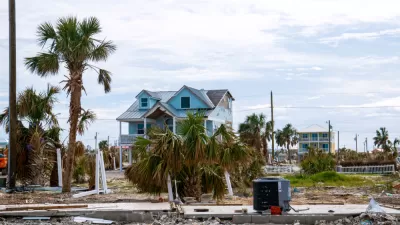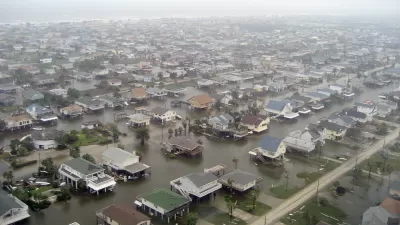A coalition of residents from flood-prone areas is urging the federal government to improve FEMA's beleaguered flood insurance program and do more to prevent construction on floodplains.

A group of flood survivors is asking the federal government to bolster what they say is an inadequate flood insurance system, prohibit "irresponsible" development in flood-prone areas, and do more to mandate disclosure on the part of home sellers.
As Oliver Milman reports, a petition organized by Anthropocene Alliance calls for a focus on relocation of housing to higher ground and warns of an imminent "great American flood migration" as more communities become unlivable. Meanwhile, residents of flood-prone areas say FEMA's flood insurance costs are too high for many households to afford, and its outdated flood zone maps do not accurately reflect current risks and the present and future effects of climate change.
"Instances of ‘nuisance’ flooding, where high tides exacerbated by sea level rise cause streets and homes to fill with water, have increased dramatically along U.S. coastlines in recent years and more powerful storms, fueled by a heating atmosphere, are bringing heavier bursts of rainfall to parts of the country. Rising sea levels alone could force around 13 million Americans to relocate by the end of the century, research has found."
While some lawmakers fear that higher insurance rates would harm low-income households, advocates say more even drastic changes are needed to prevent developers from building on at-risk land and mitigate the damage for households that can't afford to move.
FULL STORY: Flood survivors urge Congress to change inadequate insurance

Trump Administration Could Effectively End Housing Voucher Program
Federal officials are eyeing major cuts to the Section 8 program that helps millions of low-income households pay rent.

Planetizen Federal Action Tracker
A weekly monitor of how Trump’s orders and actions are impacting planners and planning in America.

Ken Jennings Launches Transit Web Series
The Jeopardy champ wants you to ride public transit.

Washington Legislature Passes Rent Increase Cap
A bill that caps rent increases at 7 percent plus inflation is headed to the governor’s desk.

From Planning to Action: How LA County Is Rethinking Climate Resilience
Chief Sustainability Officer Rita Kampalath outlines the County’s shift from planning to implementation in its climate resilience efforts, emphasizing cross-departmental coordination, updated recovery strategies, and the need for flexible funding.

New Mexico Aging Department Commits to Helping Seniors Age ‘In Place’ and ‘Autonomously’ in New Draft Plan
As New Mexico’s population of seniors continues to grow, the state’s aging department is proposing expanded initiatives to help seniors maintain their autonomy while also supporting family caregivers.
Urban Design for Planners 1: Software Tools
This six-course series explores essential urban design concepts using open source software and equips planners with the tools they need to participate fully in the urban design process.
Planning for Universal Design
Learn the tools for implementing Universal Design in planning regulations.
Heyer Gruel & Associates PA
Ada County Highway District
Institute for Housing and Urban Development Studies (IHS)
City of Grandview
Harvard GSD Executive Education
Toledo-Lucas County Plan Commissions
Salt Lake City
NYU Wagner Graduate School of Public Service





























